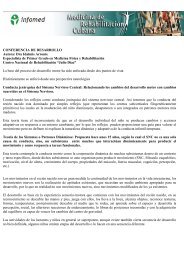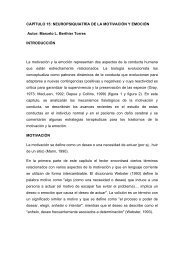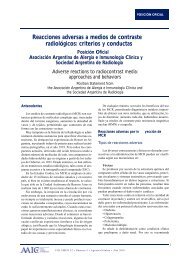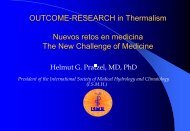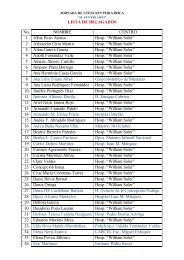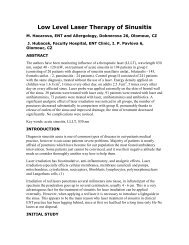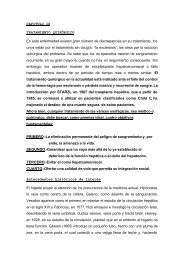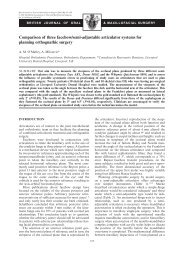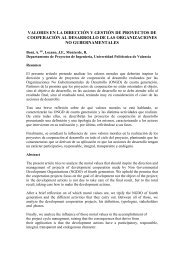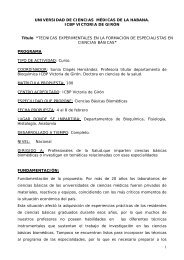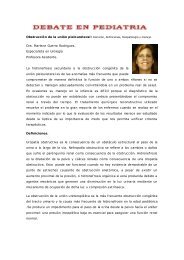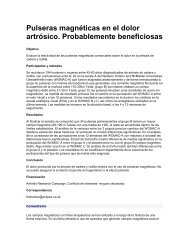pharmacology of medicinal plants and natural products
pharmacology of medicinal plants and natural products
pharmacology of medicinal plants and natural products
Create successful ePaper yourself
Turn your PDF publications into a flip-book with our unique Google optimized e-Paper software.
MEDICINAL PLANTS (NATURAL PRDUCTS)<br />
S101<br />
complement pathway. The compounds also gave rise<br />
to significant increases in IgG antibodies in serum.<br />
Both humoral <strong>and</strong> cell-mediated immunity were dosedependently<br />
enhanced. Macrophage activation was<br />
reported for cordioside (TC-2), cordi<strong>of</strong>olioside A (TC-<br />
5) <strong>and</strong> cordiol (TC-7) <strong>and</strong> this activation was more<br />
pronounced with increasing incubation times 213 .<br />
The effect <strong>of</strong> Asparagus racemosus, Tinospora<br />
cordifolia, Withania somnifera <strong>and</strong> Picorrhiza kurroa<br />
on macrophage function obtained from mice treated<br />
with the carcinogen, ochratoxin (OTA) was evaluated<br />
by Dhuley 214 . Treatment with these <strong>plants</strong> significantly<br />
attenuated the OTA-induced suppression <strong>of</strong> chemotactic<br />
activity as well as IL-1 <strong>and</strong> TNF-α production<br />
by macrophages. Moreover, Withania somnifera potentiated<br />
macrophage chemotaxis <strong>and</strong> Asparagus<br />
racemosus induced excessive production <strong>of</strong> TNF-α<br />
as compared to controls.<br />
Ray et al 215 demonstrated that ovalbumin immunized<br />
mice treated with Azadirachta indica leaf extract had<br />
higher IgG <strong>and</strong> IgM levels <strong>and</strong> anti-ovalbumin antibody<br />
titres as compared to control (humoral response).<br />
Azadirachta indica also induced cell mediated<br />
response as seen from the enhancement <strong>of</strong><br />
macrophage migration inhibition <strong>and</strong> footpad thickness.<br />
These findings were supported by Ansari<br />
et al, 216 . They found that Azadirachta indica potentiated<br />
the antibody titres following typhoid H. antigen<br />
immunisation <strong>and</strong> induced delayed hypersensitivity<br />
following administration <strong>of</strong> tuberculin <strong>and</strong> DNCB to<br />
animals. In human volunteers, it stimulated humoral<br />
immunity by increasing antibody levels <strong>and</strong> cell mediated<br />
immunity by increasing total lymphocyte <strong>and</strong><br />
T-cell count in 21 days.<br />
Oral pretreatment with leaf extract <strong>of</strong> Azadirachta<br />
indica reversed the inhibitory effect <strong>of</strong> restraint stress<br />
on formation <strong>of</strong> anti-sheep RBC antibody titres in<br />
rats immunized with sheep RBC <strong>and</strong> also the increase<br />
in foot pad thickness. It reversed the DDT<br />
induced suppression <strong>of</strong> antibody response <strong>and</strong> leucocyte<br />
migration inhibition in tetanus toxoid immunized<br />
rats. Restraint stress along with administration<br />
<strong>of</strong> DDT in subthreshold doses resulted in an inhibition<br />
<strong>of</strong> the immune response. Azadirachta indica attenuated<br />
the immunotoxicity <strong>of</strong> environmental <strong>and</strong><br />
xenobiotic stressors 217 .<br />
Root suspension <strong>of</strong> Janakia arayalpathra was found<br />
to have immunostimulatory properties in mice. It<br />
stimulated an increase in humoral antibody titres <strong>and</strong><br />
also <strong>of</strong> antibody secreting spleen cells in the plaque<br />
forming cells assay following immunisation with sheep<br />
erythrocytes. It also increased the number <strong>of</strong> peritoneal<br />
macrophages <strong>and</strong> produced an increase in delayed<br />
hypersensitivity reaction in mice 199 .<br />
The alkaloidal fraction <strong>of</strong> Boerrhiva diffusa significantly<br />
restored the suppressed humoral response in<br />
stressed rats as observed by Mungantiwar et al, 218<br />
wherein Boerrhiva diffusa increased the suppressed<br />
antibody titres following immunization by sheep RBCs<br />
in rats subjected to restraint stress. It also significantly<br />
reversed the depleted adrenal cortisol level<br />
<strong>and</strong> the elevated plasma cortisol level in the stressed<br />
rats, thus appearing to have a corticosteroid sparing<br />
effect in experimental stress.<br />
Immune-21, a polyherbal <strong>natural</strong> product, has been<br />
shown to exhibit significant immunopotentiating <strong>and</strong><br />
immuno-prophylactic activity, both in vitro <strong>and</strong> in<br />
vivo 219 .<br />
18. Adaptogens<br />
Adaptogen is a term used to describe agents that<br />
increase the nonspecific resistance <strong>of</strong> organisms<br />
against a variety <strong>of</strong> stressors. A recent review on<br />
adaptogens, 211 describes the developments taking<br />
place in this field <strong>and</strong> the problems associated in the<br />
evaluation <strong>of</strong> adaptogens.<br />
In a series <strong>of</strong> experiments the whole, aqueous st<strong>and</strong>ardised<br />
extracts <strong>of</strong> Tinospora cordifolia, Asparagus<br />
racemosus, Emblica <strong>of</strong>ficinalis, Withania somnifera,<br />
Piper longum <strong>and</strong> Terminalia chebula, were administered<br />
orally to experimental animals, in a dose extrapolated<br />
from the human dose. These animals were<br />
exposed to a variety <strong>of</strong> biological, physical <strong>and</strong> chemical<br />
stressors. The <strong>plants</strong> were found to <strong>of</strong>fer protection<br />
against these stressors 211 . All the <strong>plants</strong> reversed<br />
the effects <strong>of</strong> cisplatin on gastric emptying, while<br />
Tinospora cordifolia <strong>and</strong> Asparagus racemosus also<br />
normalised cisplatin induced intestinal hyper-motility,<br />
complying to the definition <strong>of</strong> an adaptogen. They<br />
were found to be safe in both acute <strong>and</strong> subacute<br />
toxicity studies. All <strong>of</strong> them produced immunostimulation<br />
211 . The type <strong>of</strong> extract (methanolic extract <strong>of</strong><br />
Withania somnifera was more active) <strong>and</strong> time <strong>of</strong> administration<br />
(the best effects were observed only if




